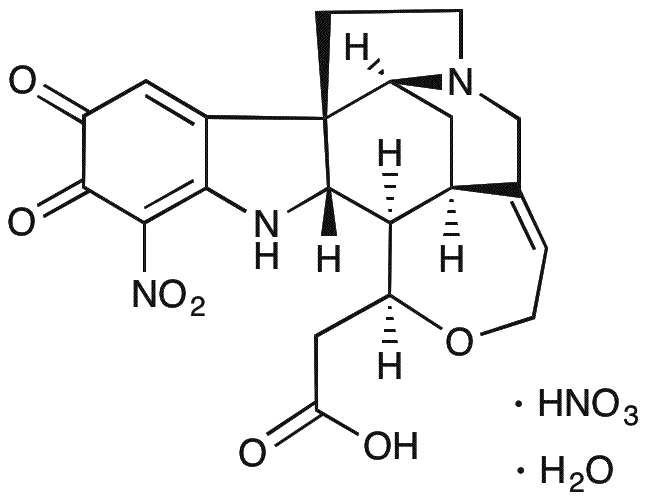Cacotheline monohydrate is widely utilized in research focused on:
- Pharmaceutical Development: This compound is often explored for its potential therapeutic effects, particularly in the development of new medications targeting complex diseases. Its unique structure may offer advantages in drug efficacy and specificity.
- Biochemical Research: Researchers use cacotheline monohydrate to study enzyme interactions and metabolic pathways, making it valuable for understanding biological processes and developing biotechnological applications.
- Analytical Chemistry: The compound serves as a standard in various analytical techniques, helping to improve the accuracy of measurements in complex mixtures, which is crucial for quality control in laboratories.
- Material Science: Its properties are investigated for use in creating advanced materials, such as polymers or coatings, that require specific chemical stability and performance characteristics.
- Environmental Studies: Cacotheline monohydrate is also examined for its potential role in environmental remediation processes, particularly in the degradation of pollutants, showcasing its versatility in addressing ecological challenges.
General Information
Properties
Safety and Regulations
Applications
Cacotheline monohydrate is widely utilized in research focused on:
- Pharmaceutical Development: This compound is often explored for its potential therapeutic effects, particularly in the development of new medications targeting complex diseases. Its unique structure may offer advantages in drug efficacy and specificity.
- Biochemical Research: Researchers use cacotheline monohydrate to study enzyme interactions and metabolic pathways, making it valuable for understanding biological processes and developing biotechnological applications.
- Analytical Chemistry: The compound serves as a standard in various analytical techniques, helping to improve the accuracy of measurements in complex mixtures, which is crucial for quality control in laboratories.
- Material Science: Its properties are investigated for use in creating advanced materials, such as polymers or coatings, that require specific chemical stability and performance characteristics.
- Environmental Studies: Cacotheline monohydrate is also examined for its potential role in environmental remediation processes, particularly in the degradation of pollutants, showcasing its versatility in addressing ecological challenges.
Documents
Safety Data Sheets (SDS)
The SDS provides comprehensive safety information on handling, storage, and disposal of the product.
Product Specification (PS)
The PS provides a comprehensive breakdown of the product’s properties, including chemical composition, physical state, purity, and storage requirements. It also details acceptable quality ranges and the product's intended applications.
Certificates of Analysis (COA)
Search for Certificates of Analysis (COA) by entering the products Lot Number. Lot and Batch Numbers can be found on a product’s label following the words ‘Lot’ or ‘Batch’.
*Catalog Number
*Lot Number
Certificates Of Origin (COO)
This COO confirms the country where the product was manufactured, and also details the materials and components used in it and whether it is derived from natural, synthetic, or other specific sources. This certificate may be required for customs, trade, and regulatory compliance.
*Catalog Number
*Lot Number
Safety Data Sheets (SDS)
The SDS provides comprehensive safety information on handling, storage, and disposal of the product.
DownloadProduct Specification (PS)
The PS provides a comprehensive breakdown of the product’s properties, including chemical composition, physical state, purity, and storage requirements. It also details acceptable quality ranges and the product's intended applications.
DownloadCertificates of Analysis (COA)
Search for Certificates of Analysis (COA) by entering the products Lot Number. Lot and Batch Numbers can be found on a product’s label following the words ‘Lot’ or ‘Batch’.
*Catalog Number
*Lot Number
Certificates Of Origin (COO)
This COO confirms the country where the product was manufactured, and also details the materials and components used in it and whether it is derived from natural, synthetic, or other specific sources. This certificate may be required for customs, trade, and regulatory compliance.


